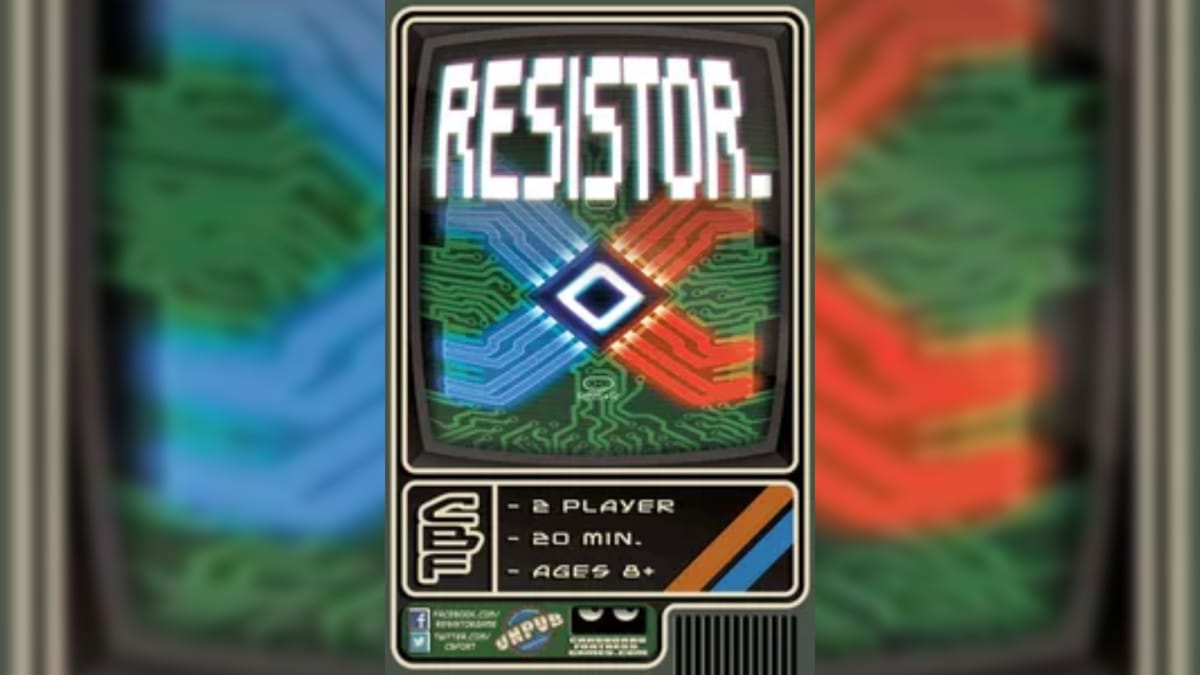RESISTOR_ is quite likely the least violent game about nuclear annihilation ever created. Instead of armies or political leaders, you and your opponent each control a supercomputer in charge of a world power's nuclear arsenal. You've been given the order to unleash your nukes, but wanting to avoid the inevitable mutually assured destruction, your goal is to hack the opposing supercomputer to trick it into raising its Defcon level instead of firing its nukes.
What Is RESISTOR_?
In practice, RESISTOR_ is kinda like a competitive version of "Pipe Dreams." Cards have circuits on them, colored either red or blue, and your goal is to connect your mainframe to your opponents using the circuits of your color (while preventing them from doing the same). Each time you do, you raise their defcon level by 1. Do that enough times, and you win! Simple enough in practice, but RESISTOR_ has a few tricks up its sleeves to keep things interesting.
First of all, RESISTOR_ makes heavy use of memorization. Cards are double-sided, so if you can remember what the flip side of each card in play is, you'll have a significant advantage. This may turn some people off to the game, but I found it didn't require an onerous amount of mental strain to have a rough idea of what cards are worth flipping. Since you can see the backs of your opponent's cards before they are played, you have plenty of time to memorize them as well, but you are not allowed to look at the back of your cards in hand. As such, the game box transforms into a holder for the draw deck, holding the cards vertically so you can't see the backside of the cards you draw. Definitely a creative solution, but standing for the cards once they are in your hand would be too (otherwise, you can't really set your cards down should you happen to need your hands free).
How Actions Are Handled
The way that actions are handled in RESISTOR_ allows for meaningful decisions each turn as well. The three actions themselves are straightforward:
- Flip Over: Flip over one of the cards in play.
- Switch Out: Take a card in play into your hand and replace it with a different card in your hand.
- Draw and Trash: Draw a card from the deck and add it to either player's hand, then trash a card from that hand.
The real kicker is that while you can choose what order you take those actions, you must take each one of them. As a result, each turn requires careful consideration of how to get the most out of your actions. Not sure what's on the other side of the card that you know you have to get rid of? Flip it over first, so you can switch it out afterward if the flip side is worse for you.
RESISTOR_ and RNG
To add a bit of unpredictability to RESISTOR_, there are "resistors." Denoted by a white diamond shape on the card, resistors can have a huge effect when they appear. First, they can allow you to lower your Defcon level if your color connects from your mainframe to the resistor. Then, they flip all the cards connected to them. Finally, they are removed from play, and the length of the board shortens. While they may seem like arbitrary nuisances at first, planning for resistors turns them into powerful tools to either quickly "heal" yourself or to undo several turns of your opponent's hard work. If both players fail to plan around the resistors, though, the board could end up so short that the game ends in a loss for both players, a mechanic that I happen to love in games.
The core game of RESISTOR_ is deep enough on its own, but there are a few optional rules included as well. Most of them provide small benefits to the losing player, such as allowing them to undo a Flip Over action, making comebacks more possible. There's also a fourth action, "Lock Down," which allows players to prevent a card from being changed (either flipped or switched out) until their next turn, with the stipulation that only cards that have both colors can be locked down. All of the rules are simple but well-designed, so they won't completely change how the game plays.
Is RESISTOR_ Worth Your Money?
RESISTOR_ is a brilliant game. Its unique theme pairs well with its unique gameplay mechanics, offering an experience that feels fresh. In nearly every aspect, it exceeds expectations. Victories feel earned, despite the inherent randomness of resistors and card flipping. Every turn requires careful planning, which is rare for a card game that can be played in under 15 minutes. Even the double-sided cards sound like they wouldn't work, but they do!
The copy of RESISTOR_ used in this review was provided by Level 99 Games. This review was originally published on 03-24-2015. While care has been taken to update the piece to reflect our modern style guidelines, some of the information may be out of date. We've left pieces like this as they were to reflect the original authors' opinions and for historical context.
Review Summary
Have a tip, or want to point out something we missed? Leave a Comment or e-mail us at tips@techraptor.net











